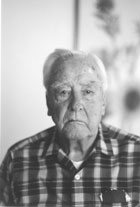Dan Carpenter, who played a preeminent role in the Hudson Guild and the Chelsea neighborhood, died on Sat. Feb. 7 in Tucson, Ariz., where he made his home for the past 18 months. He was 95.
He suffered a massive stroke on Thurs. Feb. 5, according to his son, Roger.
Daniel Carpenter came to Chelsea in 1931 fresh out of Denison College in Ohio and took a job at the Hudson Guild to work under John Lovejoy Elliott, founder of the Guild and a leader of the Ethical Culture Society.
“It was a good job, $11 or $12 a week, a place to live, with breakfast and dinner five days a week,” he told a Villager reporter in August 2002, recalling the days he did anything and everything at the Guild, from running after-school programs to managing the Guild farm in New Jersey where three generations of Chelsea residents took vacations.
The young Dan Carpenter became a close associate of Elliott, married his niece, Marjorie Elliott, in 1932 and served as executive director of the Guild from 1943 until 1973. He became a role model for youth and a leader on housing matters and in progressive politics in Chelsea.
Janice McGuire, executive director of the Guild, recalled a recent telephone conversation. “He seemed frail but still mentally sharp, interested and opinionated when I spoke to him last month,” she said. “I’ve kept him up to date on the reconstruction of the Guild building. We sent him drawings, sort of a progress report. After all, he was responsible for the original building nearly 40 years ago,” she added, referring to the $5 million reconstruction of the main Guild building at 441 W. 26th St. in the Elliott Chelsea Houses.
Paul Balser, co-chairperson of the Guild board of trustees, paid tribute to Carpenter’s influence in the settlement house movement and in the community. “He really brought people together,” said Balser. “He was the embodiment of the settlement house idea of people joining together to make life better.”
Emily Scheuer, wife of retired Congressmember James Scheuer and a former Guild trustee, recalled meeting Carpenter when she was a 22-year-old teaching assistant at the Guild. “He was a lovely guy and very involved in reform politics,” said Scheuer, who with her husband became a close friend of the Carpenter family. Marjorie Carpenter died in 1980.
“He taught me the first words I spoke in English when I came to New York from Puerto Rico,” said Rita Feldman, a former Community Board 4 member and former president of the 10th Precinct Community Council.
“He was head of the precinct council for years,” said Feldman, “And he was THE social worker in Chelsea. If you needed a job he could get you one — If you needed someone to talk to, you went to him. He was a real heartthrob, very good looking and a gentleman. Women were crazy about him and he wasn’t aware of it.”
“In many ways, he was both the mayor and governor of Chelsea,” said City Councilmember Christine Quinn.
Dave Smith, former president of the board of directors of Penn South, the union-sponsored co-op with 2,800 apartments in 10 buildings in Chelsea, said Carpenter was a decisive influence in the creation of Penn South in 1961. “He played a very important role as head of the Hudson Guild during the discussions about building Penn South,” said Smith. “He led the fight for us in the community and although they accused him of all kinds of things, he stood his ground.”
Indeed, in 2002 Carpenter told The Villager, “I have a few scars on my back because of my support for Penn South. People who had to move out of the tenements that used to be here hated me and wouldn’t speak to me for years.”
Soon after the end of World War II, Carpenter prevailed on the community to accept integration when tensions between black and white prospective tenants ran high over tenanting the apartments in the Robert Fulton and the Elliott Chelsea houses.
Bresci Thompson, 95, born and raised in Chelsea where he still lives, was already a longtime member of the Hudson Guild when Carpenter arrived at the age of 22. “He was a few months older than me,” Thompson recalled. “He was a loveable person, welcomed in the peoples’ homes. I was on the [Hudson Guild] board for 43 years and we both fought for what we believed was in the spirit of Dr. [John Lovejoy] Elliott,” said Thompson.
The Hudson Guild is planning a memorial service to be announced, in the spring. “We’re going to bury his ashes in the Guild farm in New Jersey in the spring,” said Roger Carpenter. “There’s a blue spruce there where my mother’s ashes are buried and that’s where he wants to be.”
The Guild sold the farm in 1998 but still has limited use of the property.
In addition to his son, his daughter-in-law and several nieces, all of Tucson, Ariz. survive.





































